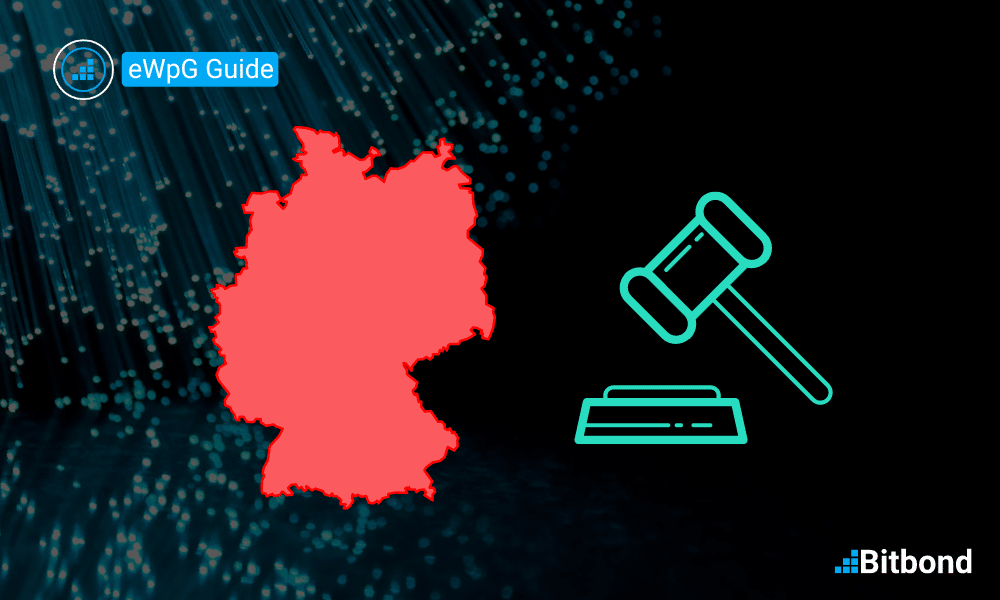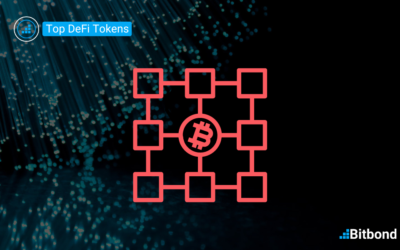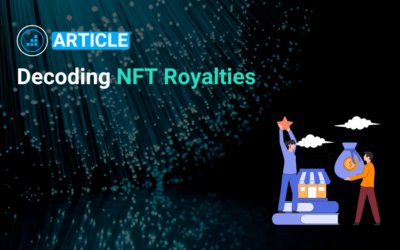What is eWpG?
Table of Contents
As Germany focuses on the regulation of crypto markets, the German Electronic Securities Act, aka “Gesetz zur Einführung elektronischer Wertpapiere (eWpG),” officially came into force on June 10th, 2021, about a month after it passed the federal parliament on May 6th, 2021.
In 2019, Germany was one of the first countries to enable financial institutions to store and deal with crypto-assets. The German ‘Act Implementing the Amending Directive on the Fourth EU Anti-Money Laundering Directive‘ enabled regulated institutions to provide custody of crypto assets as a new type of ‘financial service’ by incorporating it into the German Banking Act (Kreditwesengesetz – KWG).
This resulted in having all businesses looking to deal with crypto-assets on behalf of third parties apply for a crypto custody license.
The newest law (the “eWpG”) enables the issuance of securities (aka asset-backed security tokens) through newly established electronic securities registers, of which Distributed Ledger Technology (DLT) can be considered a qualifying register. This is revolutionary as it abolishes the necessity to issue and deposit a (physical) securities certificate. It is important to note that the “eWpG ” does not cover all types of securities yet.
The Electronic Securities Act at this stage covers mainstream bonds (Inhalberschuldverschreibungen) and certain electronic fund share certificates.
The German electronic securities act is crucial for institutions looking to utilize asset tokenization for the issuance and management of electronic securities. It is widely believed that the new law will pave the way to widespread changes in capital markets, including greater issuance, settlement, and asset transfer efficiencies.
What does the german electronic securities act (eWpG) consist of? In addition to providing a broad understanding of this newly introduced law, this article will shed light on key elements of the eWpG.
What does the eWpG change?
The act’s goal is for electronic securities to carry the same rights and obligations as physical, certificate-based securities, which fall under the Principle of Technological Neutrality as adopted in Germany. This means that crypto-securities are considered securities under the German Custody Act (Depotgesetz) and can only be held for third parties by a bank with a custody license or a CSD.
In other words, the crypto custody license mentioned above is not sufficient to safekeep crypto securities or so-called security tokens but only non-security crypto assets.
Consequently, a new form of financial service has been created: Crypto Securities Registry Management (Kryptoregisterführende Stelle); this service can only be provided by qualifying financial institutions under the German Banking Act.
As per section 1 of the German Electronic Securities Act, the eWpG applies to mainstream bonds (Inhaberschuldverschreibungen) and certain electronic fund share certificates. It does not yet cover the issuance of company shares, stock, or real estate. However, some forms of equity can be tokenized. All payment proposals must be assigned to the owner of the electronic security (Elektronisches Wertpapier) as the eWpG establishes bonds as crypto securities.
Therefore the right of receiving any payment documented in the bond certificate/token follows the right to possess the token. Thus, all payments must be completed to the owner of that electronic security.
The act also defines electronic securities as security without a certificate. The issuance of electronic securities is completed through entry into an electronic securities register instead of issuing a (physical) securities certificate.
It also differentiates between Centrally Registered Securities (Zentralregisterwertpapiere) and Crypto Securities (Kryptowertpapiere):

Central Register and Crypto Securities Register under eWpG
Furthermore, the eWpG provides clarity on the different types of registers:
- Central Register: composed of a “Register Management Body ” (Register-führende Stelle), it consists of securities clearing and a deposit bank (Wertpapierdepotbank); for example Clearstream AG. The custodian must be authorized by the Issuer, and must possess a Permit for Custody (Depotgeschäft).
- Crypto Securities Register: composed of a “Register Management Body ” (Register-führende Stelle), it consists of a third party named by the issuer. Otherwise, the issuer itself.

Technical requirements of a Crypto Securities Register
- § 16: A crypto securities register must be maintained on a counterfeit-proof (Fälschungssicher) recording system. Data is logged chronologically and stored in a manner protected against unauthorized deletion and subsequent modification.
eWpG requirement for the management of the Crypto Securities Register
The Management of Crypto Securities Register (Kryptowertpapierregister-führung) is now considered a regulated financial service under the German Banking Act (KWG). Businesses who wish to operate in this kind of service must apply for a license to the German Financial Authorities (BaFin).
Here are some of the main requirements that should be attained by entities looking to manage the Crypto Securities Register:

Further regulations in eWpG
Additionally, electronic securities are recognized as physical objects, which in this context also makes the property law (Sachenrecht) applicable.
Several implications come along with the act:
- The legal assumption that a person that possesses the security is also the legal owner
- Possession and ownership can also be split, e.g., between owner and custodian
- Transfer of electronic securities according to property law principles
Reasons and intention behind introducing such regulations
The main objective of the German government’s blockchain strategy is to capitalize on the opportunities that blockchain technology offers and to harness blockchain’s potential for advancing digital transformation. The strategy defines priority measures in five areas:
- Ensuring stability and stimulating innovation in the financial sector
- Advancing innovation by providing funding for projects and living laboratories
- Facilitating investment by putting reliable investment conditions in place
- Harnessing digital technology to improve administrative services
- Disseminating information: knowledge, networking, and collaboration
Blockchain technology is currently one of the most widely discussed digital innovations. The German government’s strategy outlines a policy framework for innovations based on blockchain technology to identify and harness blockchain’s potential while simultaneously preventing its misuse. At the same time, the German government is committed to the Principle of Technological Neutrality.
Key takeaways
Generally, this law is a step in the right direction towards providing financial institutions with the freedom to choose the methods they see fit for securities lifecycle management, such as whether to issue securities fully digitally or not. The act, while revolutionary, may due to 1) the approaches in different jurisdictions regarding electronic securities and 2) the expected European legislation, only be a “bridge-solution.”
The scope of this law will hopefully be broadened over time to incorporate additional instruments.
The German Electronic Securities Act (eWpG) feeds the public’s appetite to use innovative technologies and definitely provides legal certainty for the market as a whole. It facilitates further market integrity and more investor protection. The act places increased responsibility and opportunity into the hands of banks and out of the hands of CSDs.
Don’t hesitate to let us know your opinion on the matter or contact us for further information regarding implementing blockchain-based products within your institution. You can also check out our Web3 tokenization.




